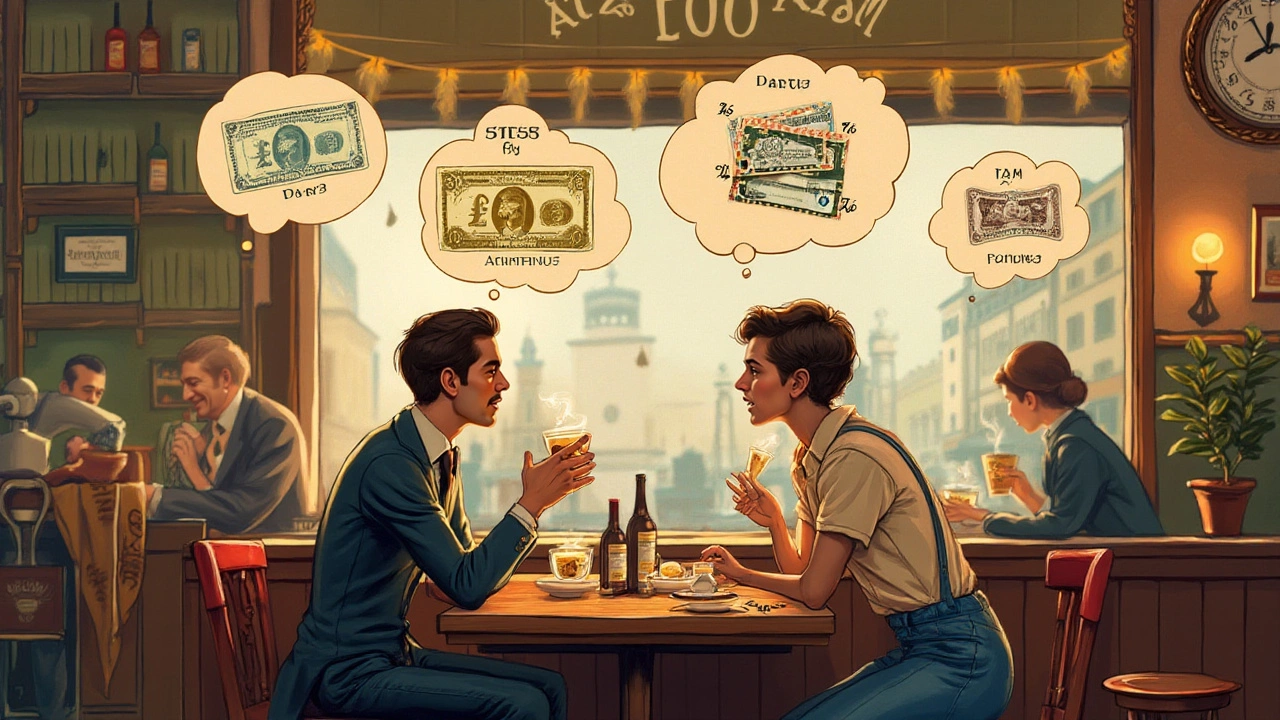Language is an ever-evolving tapestry, constantly reshaped by the people who speak it. Among its vibrant threads is street slang, a dynamic and often playful component of expression. When it comes to money, slang terms can be as colorful as they are varied. Today, we turn our attention to the street slang for $1000.
If you're new to the term or simply curious about its roots, this article is here to guide you through the ins and outs of a thousand dollars' many aliases. Whether used in business dealings, casual chat, or within cultural contexts, this slang carries its own special significance, often reflecting the values and creativity of the communities that embrace it.
- Street Slang Origins
- Modern Uses of Money Slang
- The Significance of '$1000'
- Cultural Influences on Slang
- Tips for Understanding and Using Slang
Street Slang Origins
Understanding the origins of street slang for money like '$1000' requires us to look back at not just economic history, but cultural and social threads as well. Slang, by its very nature, is born out of everyday language, providing a shorthand that captures not only the essence but the creativity of its users. One of the earliest examples of money slang is 'grand,' which is regularly used to refer to $1000. Its roots can be traced back to the early 20th century, likely stemming from grand as an adjective to mean great or large which naturally fit the considerable amount that a thousand dollars represented at the time.
The use of ‘grand’ in this casual way may have spread from the bustling streets of New York where immigrant communities, varied in their origins, influenced the enchanting mosaic of the city’s dialect. Slang evolves rapidly, and the street lingo for money often gets crafted with wit and necessity, turning everyday transactions into more than just exchanges of goods. If we look at the jazz era, we find a similar process, where musicians, often living on the edge of economic stability, developed their own vocabulary to discuss fees and payments in a way outsiders might not readily comprehend.
Throughout history, influential writers and speakers have commented on slang as a marker of both rebellion and identity. Famed author Mark Twain once noted, "Slang is the language which takes off its coat, spits on its hands – and goes to work."
In the corridors of commerce or the buzz of a street market, slang helps cement relationships and establish trust. It's about discerning a community and being a part of it. While official banking terms present money in rigid fonts and strict definitions, street slang wears it like a worn baseball cap, familiar and approachable.Slang, after all, isn’t just about secrecy; it’s about belonging and code switching seamlessly between worlds.
Today, our evolving linguistic landscape witnesses new terms arise as old ones fade, leaving behind echoes of their origins. The fact that ‘grand’ still holds sway speaks to its primary status and perhaps to the unchanged reality of money's power in our world. The influence of modern music genres like hip-hop can also not be disregarded in shaping our current lexicon for money, where $1000 might be casually referred to alongside other creative nicknames. Reflecting not just what is, but what could be, street slang shapes our understanding as much as it describes our actions in its own textured way.
Statistics hint at how quickly slang spreads and shifts with social currents. In a survey conducted across major urban centers, it was found that over half of the teens used at least one monetary slang term daily, showing the integral role it plays in contemporary use. A staggering revelation indeed. This continuous metamorphosis is the essence of language, a living organism adapting to the cultural climates that nurture it. Slang remains a true testament to the ingenuity of human expression, colorful and ever-unpredictable.
Modern Uses of Money Slang
The colorful world of slang is constantly evolving, and when it comes to money, language has a vivid flair. Money slang emerges from the streets and has found its way into music, films, and everyday conversations. For $1000, the term 'grand' or simply 'G' is frequently used. This isn't just a random pick; these words are embedded in our culture, used by different generations to add a splash of color to the concept of currency. This transformation of language reflects the creativity and adaptability of communities as they find new ways to express value and wealth.
Slang for money is not just about flashy terms; it represents an exchange of cultural ideas. The term 'grand' for $1000, for example, roots back decades, primarily popularized by crime dramas and classic films where large sums were dealt in hush-hush deals under dim lights. In modern music, especially hip-hop, these terms take on a life of their own, often used to paint pictures of success, struggle, and ambition. The usage of these terms allows artists to connect deeply with their audience through a common language that conveys more than just numerical value but also a certain lifestyle or mindset.
In everyday life, understanding these terms can help in making social connections and avoid potential misunderstandings. With the internet bringing people from diverse backgrounds closer together, knowledge of these terms has become more crucial. This can be particularly important in big urban centers where markets, both literal and metaphorical, are buzzing with diverse interactions. Learning the local money slang can open doors to better communications and foster a sense of belonging in a multicultural environment.
Technology and social media play a significant role in the evolution and dissemination of these slang terms. Platforms like Twitter and Instagram, where brevity is key, offer an ideal space for such concise expressions to flourish. Here, slang terms morph rapidly and go viral, showing up in hashtags and viral content. They create trends and memes that amplify how widely these terms are understood and adopted globally.
Critically, the impact of using such slang extends beyond conversations. In online discussions and financial literacy forums, incorporating terms like 'grand' offers a way to educate others about financial management in an approachable, relatable manner. Suddenly, discussing substantial sums becomes accessible and surprisingly less daunting, breaking down

The Significance of '00'
Street slang is not only a linguistic quirk; it serves as a reflection of socio-economic conditions and cultural creativity. When we dive into the significance of the slang term for $1000, it becomes clear that this is more than just a number; it symbolizes a milestone for many. Often referred to as a 'grand' in the U.S., the term evokes images of substantial financial achievements or goals for individuals navigating not just the urban landscape but life in general. Bringing home a grand can mean paying rent, fulfilling a dream, or simply having a secure moment in a financial month that otherwise fluctuates. Interestingly, the term 'grand' dates back to the late 19th century, reportedly tied to the historical backdrop of horse racing, where one thousand dollars marked significant stakes.
This particular increment of money also represents thresholds in personal finance. For instance, many people set their eyes on saving their first thousand dollars as an achievable financial goal. Financial advisers frequently recommend starting an emergency fund with this amount as a foundation. Even in popular culture, $1000 features prominently, whether as a jackpot amount on a game show or a plot device in films illustrating a character's quest for financial stability. Money is a universal language, yet the meanings we attach to certain figures are culturally specific and shaped by our experiences and aspirations.
The significance of a thousand dollars can be observed under the economic microscope too. Take, for example, a study from the Federal Reserve, which noted that a significant percentage of Americans would struggle to cover an unexpected expense exceeding $400 without using a credit card or borrowing money. This data highlights how amounts up to $1000 are crucial in the daily economic reality for many. In this context, the street slang not only embodies a sense of aspiration but also underlines real-world financial challenges and goals.
'Language comes alive with the life of its speakers. Every phrase carries the history, the joys, and the struggles of the people who use it.' - Unknown
The term's significance extends into music, literature, and television, where protagonists often chase after that all-important thousand dollars as it represents both their immediate and ultimate dreams. It could be the money needed to fix an old car, a tuition fee, or simply to cover bills. This is where the blend of slang and significance paints a broader picture—one where the value of $1000 isn't just in currency, but in what it can metaphorically unlock. Whether it's a rapper's lyric boasting of having 'grand' or a line in a novel, the term captures attention and respect.
In closing on this note, street slang for $1000 goes beyond the casual and ventures into the narrative of survival and success. It’s no wonder that despite its seemingly mundane utility, it holds a profound place in how financial conversations are shaped across different platforms and cultures. For people in tight-knit communities, understanding and using these terms can mean fitting in, or more significantly, harnessing the power of connection and communal understanding through language.
Cultural Influences on Slang
Culture has a remarkable way of shaping the language we use, and nowhere is this more evident than in the realm of street slang for money. The influences that cultures imprint upon language are vast, driven by music, film, literature, and even geographic regions. This rich tapestry of influences has made slang a fluid, ever-changing form of speech that both reflects and shapes societal values. When it comes to slang for a hefty sum like $1000, the cultural significance becomes even more pronounced as it finds its place in narratives that speak of wealth, aspiration, and sometimes even survival.
Take, for example, the term "grand" for $1000. Its origin is often tied to the early 20th-century gangsters of America. The use of this term highlights the cultural connection between money and power, especially in the contexts of crime and prohibition. Popular culture, with classic gangster films — where exchanges often involved a cool "grand" — helped solidify this word as a mainstay in the money slang lexicon. The portrayal of money in these settings contributes to public perception, associating financial success with both glamour and danger.
Music has also played a part in embedding these terms into everyday use. In hip-hop, for instance, the frequent references to dollars, often with evocative slang, paint lyrical portraits of financial success and hardship. These musical influences echo across radio waves, embedding the words in our collective consciousness. Artists use these terms to weave stories with words that resonate with listeners and convey experiences with authenticity and flair.
A fascinating aspect is how these terms travel across different regions and communities, each imprinting its cultural touch onto the slang. In America, for instance, urban centers often lead the way in trending terms before they trickle into smaller towns and beyond. Meanwhile, across the pond in the UK, you might hear a "bag" used in similar conversations, illustrating how geographic and cultural differences give rise to variant meanings and uses.
Slang terms also hold significant meaning in different aspects of people's lives. In communities where financial success is highly valued or aspired, these terms can symbolize achievement and social status. This symbolism often crosses into digital realms too, where memes and hashtags help to circulate these terms, giving them new life and allowing them to evolve in a truly modern context. As slang moves with the times, it carries cultural narratives along, allowing them to find new audiences and grow in unexpected ways.
"Slang is language that rolls up its sleeves, spits on its hands, and goes to work." - Carl Sandburg
So, as we navigate through the delightful diversity of money slang, it’s clear how deep cultural roots play a role in its creation and propagation. Whether it's through films that bring to life thrilling historical heists, or lyrics of songs echoing across generations, understanding these influences gives us a window into the myriad ways people express their values and identities. And in the age of instant communication, these words continue to evolve, echoing the ever-changing cultural landscape they are born from.

Tips for Understanding and Using Slang
Slang has a unique way of infusing language with a sense of identity and belonging. When it comes to street slang, like terms for a $1000, understanding its nuances can provide insights into cultural dynamics. One of the first steps in grasping slang is to familiarize yourself with its origins. Many slang terms for money have deep-rooted historical contexts, often linked to vernacular that evolved among specific groups. For instance, the term 'grand' is believed to have stemmed from the grandiose nature of having such a sum during the early 1900s in America.
Fluent use of slang not only involves knowing the terms but also understanding the context in which they are used. Slang thrives in casual settings where rigidity in language takes a backseat to creativity and spontaneity. It's in these spaces that people can communicate shared experiences or values through shorthand. Whether in hip-hop lyrics or street markets, hearing slang used authentically can provide clues about its appropriate usage. Actively listening and observing can be as educational as formal study.
Using slang rightly demands a good sense of timing and audience. Consider the environment and participants before you throw in a slang term mid-conversation. Being comfortable with whom you're speaking to can make or break how your use of slang is received. A significant part of this involves understanding your audience’s characteristics and ensuring your use of slang doesn’t appear forced. "Slang is like a rubber band, people’s acceptance stretches and contracts depending on context," language author Gretchen McCulloch once noted.
For those wanting to weave more casual slang terms like 'grand' into their everyday conversation, practice helps. Engage with media that uses such language naturally. Listen to music, watch movies, or even read books where these terms are embedded in dialogue or narration. It’s crucial to note that not all media representations are accurate reflections of commonly accepted use, so diversify your sources to gain a broader understanding.
Lastly, remember that language is fluid, and part of what makes slang exciting is its ever-evolving nature. What might be hip today could very well be passé tomorrow. Stay updated by joining forums or communities where slang is frequently used and discussed. A fun but insightful way to expand your street slang vocabulary is through interactive resources like apps or online quizzes that test your knowledge of money slang and other terms as well.







